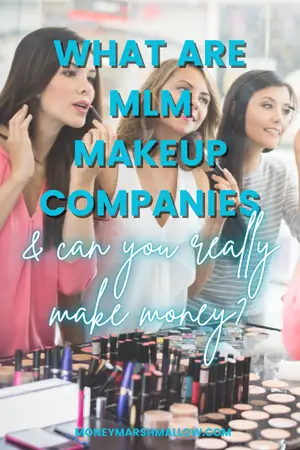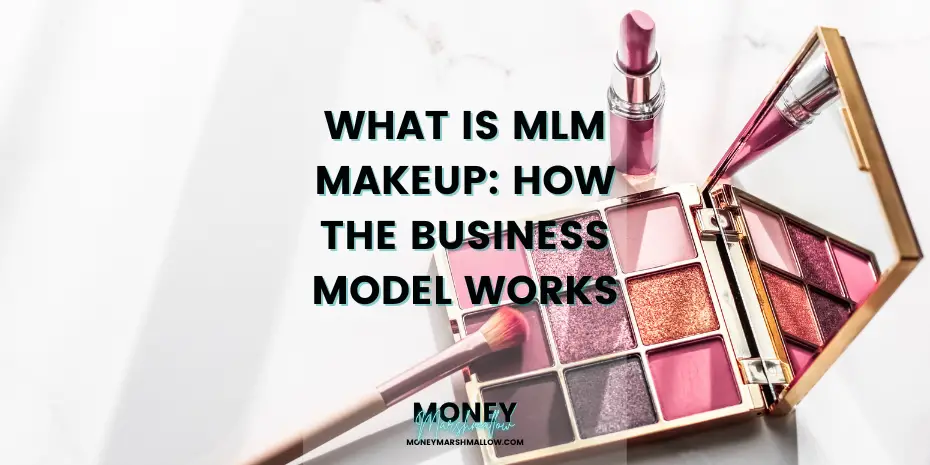Have you ever seen eye-catching photos of vibrant lipsticks or shimmery eyeshadow palettes splashed across your social media feed, accompanied by claims of financial freedom and entrepreneurial dreams with “MLM makeup companies”? But what exactly is MLM makeup?
Multi-level marketing (MLM), also known as network marketing, operates on a unique business model. Instead of traditional retail sales, these companies rely on independent distributors to sell their products directly to consumers. These distributors build teams by recruiting others, earning commissions on both their own sales and the sales of their downline. They promise flexible work hours, the chance to be your own boss, and the allure of earning a healthy income while promoting “luxurious” products.
But before you get swept away by the rosy online landscape, it’s crucial to delve deeper. This article takes a closer look into the realities of makeup MLM companies. We’ll tackle the financial potential, ethical concerns, and other considerations, helping you answer the crucial question: is MLM makeup the key to your entrepreneurial dreams, or is it something else entirely?
What is MLM makeup and how does the business model work?
MLM makeup is cosmetics and beauty products sold through multi-level marketing, where distributors earn commissions from their own sales and by recruiting others. This model utilizes social networks for sales and recruitment, creating a hierarchical earning structure.
The commission structure typically involves distributors earning a percentage of the sales they directly generate. In addition, they earn a smaller percentage from the sales made by their downline. The downline consists of the individuals they’ve recruited and possibly those recruited by their recruits, extending down several levels. The MLM model incentivizes distributors to not only sell products but also to recruit and train new members, as they can earn additional income from the sales generated by their downline.
Common features of MLM makeup companies include a strong emphasis on recruitment and social selling. Distributors are encouraged to build their networks by recruiting friends, family, and acquaintances to become distributors themselves. Social selling, often facilitated through social media platforms, allows distributors to promote products directly to their networks, leveraging personal connections and testimonials to drive sales.
The commission model incentivizes distributors to focus on both product sales and recruiting new members, as their earnings are directly tied to the performance of their downline. This creates a dynamic where distributors are not only salespeople but also mentors and leaders who guide and support their team members to success. While this model can offer significant earning potential for successful distributors, it also requires dedication, hard work, and effective leadership skills to build and maintain a thriving network.
Is multi-level marketing a pyramid scheme?
The key difference between MLM and a pyramid scheme is that MLM keeps the focus on sales while pyramid schemes generally focus on recruitment. Even though MLM focuses on sales, earning money is difficult without also being successful at recruiting additional salespeople and thus increasing commissions.
Differentiating makeup MLMs from cosmetic pyramid schemes can be challenging, and some consider certain MLM practices problematic. Here are some red flags to consider:
- Excessive focus on recruitment over product sales.
- Unrealistic income claims and promises of quick wealth.
- Difficulty in making profits solely through product sales.
- High initial investment costs with limited product value.
- Pressure to purchase additional products or recruit others.
It’s also worth noting that multilevel marketing is legal, but pyramid schemes are not. To avoid being scammed by a fraudulent company, research it and its products thoroughly.

Top MLM makeup companies
Here are some examples of popular cosmetic MLM companies:
- Mary Kay: Global brand known for its pink Cadillacs and focus on empowering women, offering a comprehensive makeup line.
- Avon: A global giant that has been around since 1886, Avon offers a wide range of beauty and personal care products beyond just makeup.
- Rodan + Fields: Founded by dermatologists Dr Katie Rodan and Dr Kathy Fields, the brand offers premium skincare products and makeup.
- Younique: Specializes in personalized makeup consultations and promotes female empowerment, attracting a dedicated following.
- LimeLife by Alcone: Offers professional-quality makeup, particularly popular among makeup artists and beauty enthusiasts worldwide.
- Beautycounter: Emphasizes clean and natural ingredients, offering both skincare and cosmetic products.
- Forever Living: Specializes in aloe vera products with a wide product range from skincare products to fragrances and weight management.
- Thrive Causemetics: Promotes philanthropy and offers makeup, aiming to empower women through its business model.
- SeneGence: Known for their long-lasting lipsticks and other makeup, attracting a loyal following.
- Nu Skin: Primarily a skincare brand, also offers some makeup products and essential oils.
Remember, thorough research is crucial before joining any multi-level marketing company. Consider the financial structure, income potential, and ethical considerations before making a decision. This list is for informational purposes only and does not constitute an endorsement.
Should you join a makeup MLM?
On the surface, MML makeup companies may appear to be a great opportunity for individuals to have their own business or side hustle, making money from products they believe in.
How it works:
- Distributors buy starter kits: To join, you typically purchase a starter kit containing makeup products and marketing materials. This initial investment can range from a few hundred to thousands of dollars.
- Sales & commissions: You earn money by selling makeup directly to customers. However, the key aspect of MLM is also recruiting others to join the company under you. You then earn commissions not only on your own sales but also on the sales of those you recruit (your downline). This creates a multi-layered network of distributors, hence the name Multi-Level Marketing.
- Recruitment: Many MLM makeup companies heavily emphasize recruitment, sometimes blurring the lines between selling products and building your downline. This can create pressure to recruit friends, family, and acquaintances, potentially impacting personal relationships.
- Social media presence: Social media plays a significant role in MLM makeup, with distributors often using platforms like Instagram and Facebook to showcase products, share success stories, and recruit new members.
Key considerations:
- Income potential: While some distributors achieve significant income, it’s crucial to understand that most participants earn little to no money. According to Infinite MLM Software’s data, the average annual income of makeup MLM distributors ranges from $2,500 to $5,000. Only 12% of distributors manage to earn a full-time income.
- Financial risks: The initial investment in starter kits and marketing materials, coupled with the uncertain income potential, can pose significant financial risks. In fact, the Federal Trade Commission (FTC) reports that over 99% of participants in MLM programs lose money.
- Ethical concerns: While many MLM makeup companies promote product sales, a significant concern lies in the overemphasis on recruitment. This focus can overshadow actual product sales, blurring the lines with pyramid schemes where recruitment becomes the primary objective. This raises ethical questions about the sustainability and legitimacy of the business model, as well as the potential exploitation of participants who struggle to generate income solely through product sales.
Ultimately, thorough research and a critical lens are essential before engaging with any MLM company. Weigh the potential financial risks and ethical considerations against your personal goals and values. Understand the specific company’s business model, compensation plan, and ethical considerations. Read independent reviews and consult financial reports. Remember, there’s no guarantee of success with MLM beauty companies, and the financial risks can be significant.
Related: Can you really make money selling Paparazzi jewelry?
Conclusion
While the world of MLM paints a picture of quick success and independence, it’s essential to see beyond the glitter and understand the complexities of this business model. When you understand what MLM makeup is and how the model works, it might not seem like such a great business opportunity after all. Hefty financial investments, uncertain income potential, and ethical concerns are common threads associated with network marketing companies.
Instead of joining a makeup MLM, why not explore a wealth of ethical and sustainable pathways the beauty industry offers? Whether you choose to hone your expertise as a freelance makeup artist, build a community sharing your passion, or even create your own ethical beauty product line, remember: empowerment comes from carving your own path, aligned with your values and built on genuine value. So, explore the diverse opportunities within the cosmetics industry, choose ethics over exploitation, and pave your way to a fulfilling and rewarding career.

